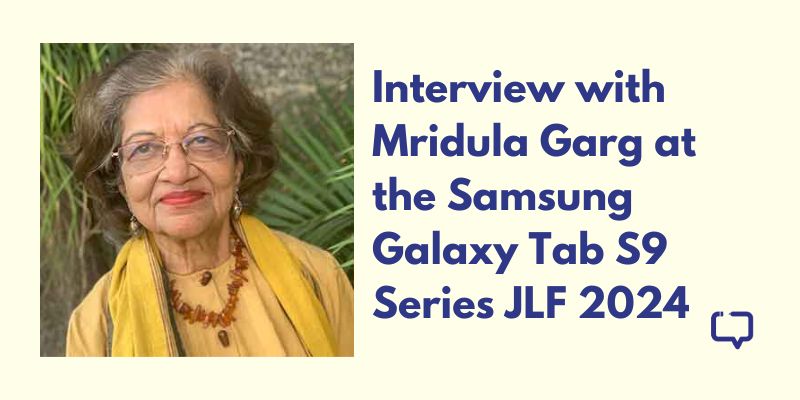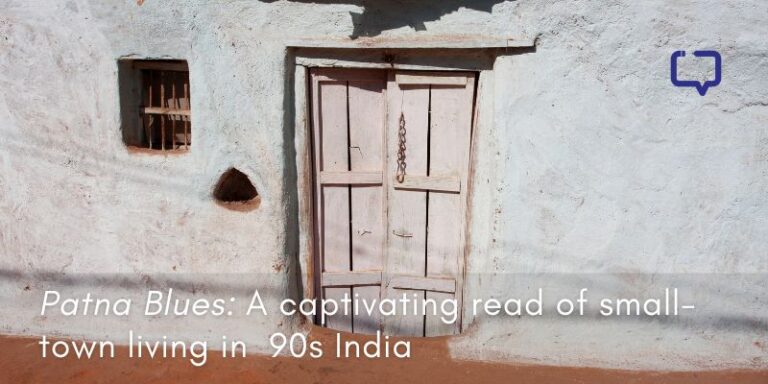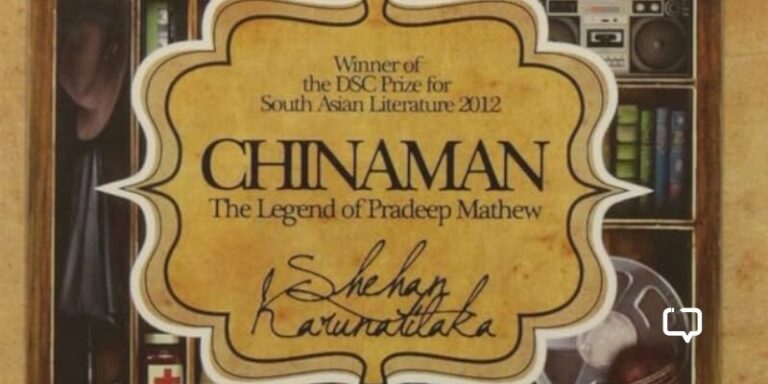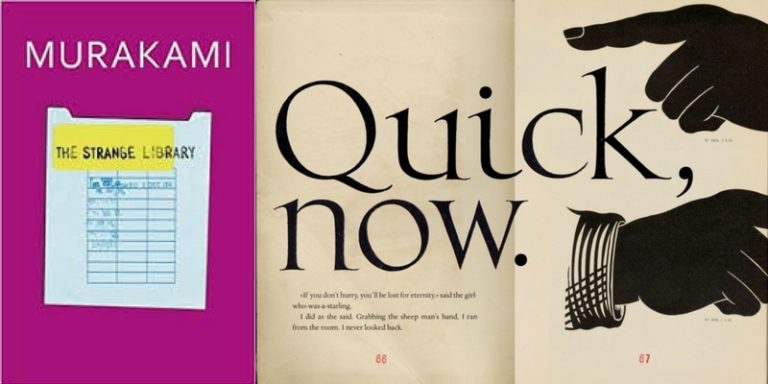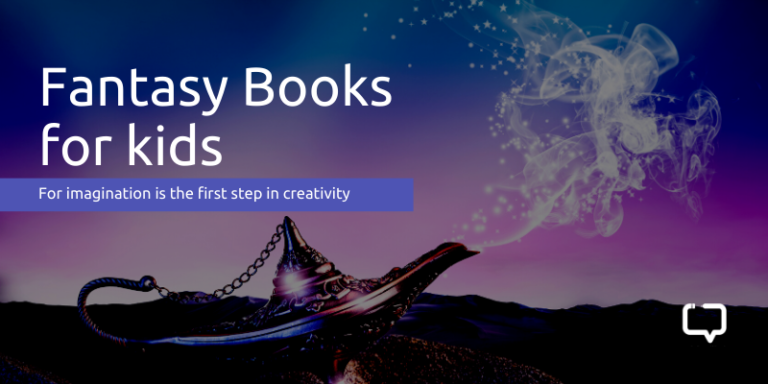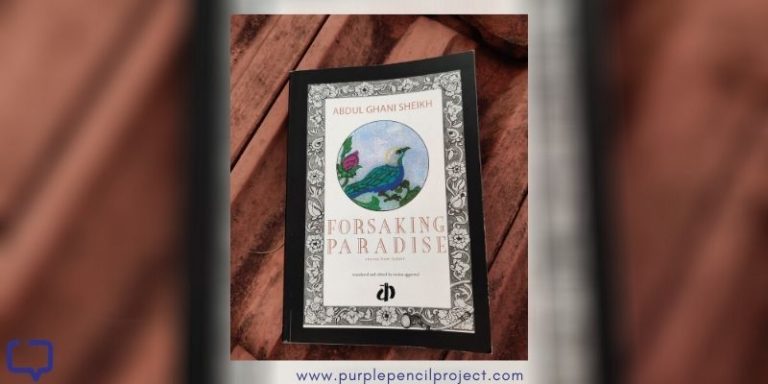Amritesh Mukherjee is in conversation with Mridula Garg where she shares her thoughts on censorship in literature, about the public reception of her work, and more.
Mridula Garg is an Indian writer who writes in Hindi and English She has published over 30 books in Hindi – novels, short story collections, plays, and collections of essays – including several translated into English. She is a recipient of the Sahitya Akademi Award.
Amritesh Mukherjee from Team P3 was in conversation with her at the recently concluded Jaipur Literature Festival.
Amritesh Mukherjee: You have often talked about censorship in literature. What is your opinion on the current state of literature and how it goes forward from here?
Mridula Garg: The problem is that when I was censored, it was ostensibly for obscenity. Censorship is there so that you may not think. A writer is not censored because of what he has written. We want to prevent other people from thinking.
What has happened now is that attention has shifted from sexuality to political dissent. Now, more censorship is on political dissent. And it’s not only writers, it’s journalists, cartoonists, column writers. Everybody is coming under the orbit of censorship. So, I think things are much worse now than they were 50 years ago when I was arrested for my crime.
Amritesh Mukherjee: Has your arrest affected how you think, work, and write?
Mridula Garg: Not at all. In fact, when I was arrested, I was in the process of writing my next novel, which was a political novel. I continued to write it, and it was published the next year. So, it did not frighten me, affect my writing, or make me write differently. But other women writers said that it had affected them.
So basically, it had harmed the literary society. It had harmed people at large. They were afraid to think. I was not afraid to think. In fact, I was made more unafraid. I decided, okay, if they can’t understand anything, let me be more frank and open and let them out. Something we’ll benefit from there. It did not change my style of writing at all.
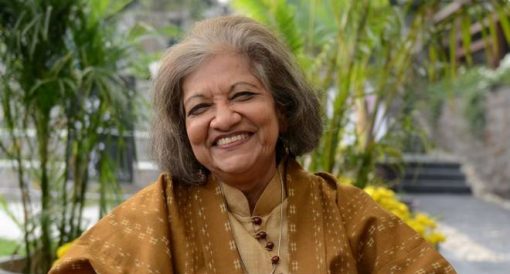
Amritesh Mukherjee: Was there any particular character or a woman whose story stood out for you in your latest book, Ve Nayab Auratein?
Mridula Garg: This is a collection of all women from all walks of life, from women who come to work in our homes, the domestic help. Professional women from all walks of life, politicians, activists, philosophers, writers. It starts with my great-grandmother, who was a very unusual person. When my mother was pregnant for the first time, she prayed that the child should be a daughter.
She prayed that the first child should be a daughter in those days. She was that unusual. And it went on like that. My mother was a very unusual person. She was not interested in children. She was only interested in books. And she read all the time. She didn’t ask us to read. Nor did she give us any books to read. But after seeing her read and how immersed she was in reading and fluent in three languages, Hindi, Urdu, and English, we learned to learn words.
If you do not respect words and do not know that one word can make a difference to the entire piece, then you better not be a writer. And we learned this from our mother.
Our father also used to read us Shakespeare’s sonnets and stories from Urdu and Persian. We were surrounded by books, books, and readers. I developed a respect, first for readers, then for writers. Because if there are no readers, then there are no books. There are no writers. The real cognoscenti are the readers, not the critics. The critics should be ignored as far as possible. They should not be allowed to affect your work. As long as the readers are reading you. The day the readers start reading you, that’s a bad day.
Once you get engrossed in a story, it loses all its complications. It becomes simple. It’s only as long as the story fails to engross you and captivate you that you find it difficult.
Mridula Garg
About this new book of mine, I don’t call it a novel. I call it a memoir. Each chapter tells a story. As they say, qissa ka qissa hai. There are a number of qissas. There are a number of stories in it. I would have called it a novel if I had written it in English. But in Hindi, what happens is that our critics are still very high bound. They would have talked about the structure of the novel, how this is not the structure of the novel, and this and that.
I thought instead of giving them ammunition for that, let me call it a memoir. And it’s not my story. It’s not an autobiography. It’s not a story of certain people. It is the story of my time, whatever happened during 85 years of my living.
At least from 5 years onwards, I could write about the people around me, and I read a lot. In fact, I read The Brothers Karamazov at the age of nine. Books were always a part of my life. And I lost all awe of great writers because I read them at a very young age. For me, it’s all right. Dostoyevsky, okay. Jainendra, okay. Jainendra was a frequent visitor to our house.
I found that the more complicated, the more complex, the more intricate a story is, the easier it is to understand. Because then you get, what I’m saying is not a contradiction in terms, you’re getting lost in it. Once you get engrossed in a story, it loses all its complications. It becomes simple. It’s only as long as the story fails to engross you and captivate you that you find it difficult.
When people say, we couldn’t read that novel, there’s something very wrong. That means that the novel was not written to be read. I have great faith in readers. The reader knows how to choose books, and they want to read. It’s only that the books are too expensive or not easily available.
We do not have enough libraries. I remember when I was a child, we used to have a neighborhood library, and people used to donate books there. I remember taking out a book; the front page was not there. It was torn. So I didn’t know what was the name of the book.
I didn’t know what was the name of the author. I read it, enjoyed it, was very disturbed by it, but I never knew what the book was. It was only when I came to Delhi and started writing after I was 32. All the Hindi writers were talking of Camus’ The Outsider, and I took the book out from the library and realized that it was the book I had read when I was 10 years old.
Without the book’s name or the author, it had made an impression on me. That meant it was a good book. We should have made those kinds of efforts.
In our school, we also had a class library. I was running, and again, books were donated because, after all, once you’ve read a book, how many times will you read it? Books were donated, and out of these donated books, we had a vast library and, from one class to another, developed the habit of reading, which is very important.
These days, people don’t want to read. They just want to see it. For short length. The total attention span is very very short. When you read a book, you first need to learn to dare to be alone with yourself. Most people are very afraid to be alone. To be left alone by yourself means you will have to analyze yourself. You will have to think, and people are afraid of doing that. It gives courage to people also. Therefore, it is necessary that they read.
Amritesh Mukherjee: Reading is considered the only active form of entertainment. All other kinds of entertainment, whether you’re watching something or listening, are all passive in any effort. What are your thoughts on that?
Mridula Garg: When you read a book, you have an image of the character. Let’s take the most ordinary and the most known person. Say, Ram or Krishna. You have an image of the person when you read a book. Be it Balmiki, Tulsidas, or any other writer.
When you see that person on the screen, the whole thing is shattered because the director has imposed his image on you. It makes the whole thing smaller, trivial, and linear. In a book, life experiences are never linear. We always have a multidimensional image, which is why people read books.
Amritesh Mukherjee: Imagining someone reading Dostoyevsky and Camus at 9 and 10 baffles me because I have read and tried to read them in my teens. Even then, they were mind-boggling. How did that work for you?
Mridula Garg: You’re innocent at that time, so you absorb it. Camus’ first sentence in The Outsider is mother died. Yes. Yesterday or the day before. I don’t know. If you read it at this age, you feel very sad. The fellow doesn’t know when his mother died. But at that age, I should understand it is not that he is not feeling pain. It’s the pain that is making him forget. So I could understand the essential thing about the person. Also, he is convicted.
Because he didn’t show any grief at the time of his mother’s death, it doesn’t matter whether you feel grief. You should show it. Because he does not show, he is accused of being heartless and not feeling any grief. The point is that at that age, I could understand that he is feeling grief, particularly when he says that when he is in jail, he remembers what his mother had done or what his mother had said, which means that he cared for her deeply.
At that age, you are unspoiled. You have only your own experience to carry with you, to depend upon. And because we had an unusual mother, father, and grandmother, I could relate to these people. My mother would say the same thing.
I remember when I got married and came home for the first time after my marriage. My father was all over me, all very emotional, hugging me, kissing me, this and that. Then he came to the station and brought me home, and my mother said, “Achha, you’ve come.” That’s it. That’s all. I could understand that it was not a lack of feeling. She was shy about expressing it or did not find it necessary to express her feelings; they were understood. Maybe it is my upbringing and my very weird family. It has to be weird; we are three sisters who write. If a family produces three writers, something has to be wrong with that family.

Amritesh Mukherjee: What were some of your major literary influences who shaped your perspective apart from these writers?
Mridula Garg: As I said, I read so many people that I can’t say I had any one person who influenced me. My favorite is Dostoevsky. In Hindi, my favorite is Manohar Shyam Joshi, who’s much later. I did not care very much for Rabindranath Thakur. But I liked other Bengali writers. Bandhopadhyay, Pather Panchali. I even enjoyed the popular books.
I was a great fan of Oscar Wilde. I’m a great fan of P. G. Wodehouse. In fact, if you want to learn to write English, you should read P. G. Wodehouse. His language is immaculate, particularly in translation. If you want to translate, you must first read P.G. Wodehouse.
Amritesh Mukherjee: You have grown up reading translated literature, like French literature translated into English. How do you see the world of translation slowly changing in Indian literature, which has been required for a very long time? How do you see it affecting your body of work in Hindi? How do you see it encouraging regional literature more?
Mridula Garg: I don’t think anything encourages literature. It is just written. A lot of works of regional languages are translated into Hindi. But not so many works of Hindi are translated into regional languages. We are very familiar with regional languages. They are not familiar with Hindi languages. Surendran Mohan Pathak’s Pulp Fiction is being translated. And Sharath Chandra, people don’t know he’s a Bengali writer. Kannadigas thinks he’s a Kannada writer.
Tamilians think he’s a Tamil writer. And we read him; we always thought he was a Hindi writer. What is frightening is that very mediocre translations are coming out, particularly in this race to get translated into English. And most English translations are bad. Most English translations, particularly from Hindi, are bad. A bad translation also kills the original.
There is a danger in translation. But simultaneously, you don’t get known or accepted in your own language group unless you are translated. I’ve suffered from it. I have had to ask HarperCollins to withdraw my book from circulation because it was so badly translated. Translation is like a two-edged sword. It has to be good.
It’s not always that something is lost in translation. There are gains in translation also. I translated my own story from Hindi to English, and while I was translating it, I felt I should have said it like this. So I said it like that in English, and then I went back and changed it in Hindi.
Because sometimes, when you’re redoing the work in another language, the nuances hit you, and you can do a better job of it. Translation is not a profession. It is just like writing literature. You have to forego your ego. Your ego has to be made subservient to the ego of the writer. At the same time, you have to be creative. It’s not an easy job.
Amritesh Mukherjee: What are your thoughts on being translated immediately after publication?
Mridula Garg: My publisher also told me why you don’t get it translated into English. I said thank you very much. Unless there is a good translator, I would rather not be translated.
I remember saying at a conference that we have survived without being read for 2000 years. So we can survive a few more years, but I’d rather not be badly touched by it.
Amritesh Mukherjee: You also write in two languages, Hindi and English. How does it affect your creative process?
Mridula Garg: We are bilingual by a quirk of history. We didn’t choose to be bilingual. We were forced to be bilingual. Let’s say it’s a joke that history committed upon us. But having said that, I feel equally comfortable in both languages.
But when I’m writing in Hindi, I can play with the language much more than in English. I’ve only recently learned to play with English, that you can break it and remake it. You can use your own words, and to hell with the grammar and to hell with the prediction because you know these English teachers ruin it for you by teaching you correct English.
Like in Hindi, I don’t care whether there is a word like this. If there is no word like that, well, it should be. Somebody said there is no word like Mazaiya. I said, there should be. One of the things that a writer does is to add to the vocabulary. Once you take that attitude, things are okay.
Amritesh Mukherjee: What are you reading, and are you working on something right now?
Mridula Garg: I just finished reading a beautiful book, The Black Hill, by Mamang Dhai. It is the history of Arunachal, but it reads as if it is habitual. This is some five centuries ago. But when you read it, you feel that this is something that has happened to the writer. [00:23:00] Very beautiful. In Hindi, I read Keedajadi by Anil Yadav, which really stayed with me. This one is about a jadibooti that grows in Uttarakhand and is supposed to increase virility. Okay. It’s very costly and very difficult to cultivate. So this book is about the rigorous work environment of that cultivation.
Thankfully, I’m not working on anything because I’ve just written this massive book, which took me six years. I do write political commentary for TheWire and other things. That I can’t help. So I write. I’ve always been anti-establishment. Whoever was in the establishment. So I write that.
There is great pressure on me to write a book on Delhi because I feel that all those things will die with me once I die. I have lived in Delhi from very early days. You’ll feel the city change. All the changes, all the great people who were there, who are no longer there, and all the small little things that made the Delhi culture what it was. Maybe I’ll write a book on Delhi. And this time in English.







